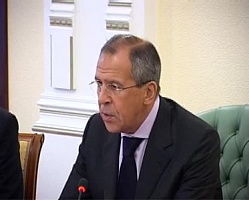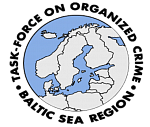Summary of Remarks by Russian Minister of Foreign Affairs Sergey Lavrov at the Twelfth Session of the Barents Euro-Arctic Council, Murmansk, October 15, 2009
Ladies and Gentlemen, Colleagues and Friends,
Today we can state with satisfaction that the prevailing development trend in the North is a dynamic intensification of cooperation and mutual understanding among the Arctic states. Our long experience in relationships and the work of one of the system-forming intergovernmental organizations in the region – the Barents Euro-Arctic Council – convincingly attest that our countries can solve any problems by relying on the now firmly established tradition of collaboration.
The story of the BEAC is a success story. Over its years of existence, the Council has established itself firmly on the political map of Europe and gained a reputation as an organization that prefers, rather than loud declarative statements, concrete action for the benefit of the people living in the region. Although our collaboration is mostly composed of hundreds of small projects, each of them is maximally close to the practical interests of those involved. The BEAC partners have grasped and harnessed the specifics of the North, where even the harsh climatic conditions conduce to mutual help among people and between nations.
BEAC can take credit for a lot of useful things. But our cooperation still has great potential, opening up broad horizons for us. A powerful factor in strengthening regional collaboration will doubtless be efforts to implement the existing plans for developing the hydrocarbon resources of the Barents Sea continental shelf, and to launch other promising projects for exploring and exploiting the natural resources of the Arctic seabed and subsoil and developing and improving infrastructure. In general, hardly anyone would argue with the fact that the role of the Barents Euro-Arctic Council in Arctic and, indeed, world affairs objectively will only increase.
Summarizing the chief outcomes of Russia's BEAC chairmanship in 2007-2009, I would like to point out that we have succeeded in fulfilling the tasks that were set in the Joint Communiqué of the Rovaniemi session and in the Russian Chairmanship Program. As you know, our priority was to "ensure sustainable development in the Barents Region with emphasis on the socioeconomic factors closely tied to the observance of environmental requirements, as well as support of the indigenous peoples." Here are just some of the most significant developments and trends in the Barents cooperation over the past two years.
In December 2008, the first intergovernmental agreement in the history of the BEAC, on cooperation in emergency prevention, preparedness and response, was signed in Moscow. As a follow on to it, extensive international training exercises, Barents Rescue 2009, were held in the Murmansk Region this past September.
A whole array of long-term specific cooperation plans was adopted. Thus, the Working Group of Indigenous Peoples drew up the Action Plan for 2009-2012, outlining priorities, in particular, in the areas of their traditional economic activities, preservation of their distinctive cultures and national languages, health care, and the protection of the environment where the Arctic indigenous peoples live. A long-term program of regional cultural cooperation for 2008-2012, "New Trends in the Barents Region," was approved at the BEAC culture ministers meeting in Arkhangelsk in June 2008 and is being implemented. Several programs have been adopted and are being carried out in the joint working group on health care and other social issues, including a major three-year support program for children and young people in the high risk group. Such long-term plans constitute a significant contribution to ensuring continuity of cooperation within the BEAC.
The practice of combining efforts by various BEAC thematic working groups to deal with complex tasks has yielded good results. For example, at the initiative of the environmental working group – and the Norwegian Chairmanship organized its very intensive and productive activity – a regional intersectoral conference on climate change in the Barents Region was held in September in Vadso, Norway, for the first time. The scientists and local area representatives arrived at the conclusions and recommendations that help ease, in particular, the adaptation of the Arctic indigenous peoples to climate change and open up new potential areas for the Barents cooperation. Mention can also be made of the synergies arising from the incipient interaction of the BEAC working groups dealing with economic matters – trade, transportation, customs cooperation. Held in December 2008 in Arkhangelsk, the ‘Barents Industrial Partnership' international conference bore out everyone's disposition towards practical cooperation in such areas as collaborative efforts of the chambers of commerce of the countries of the region, the optimization of the work of large ports, the development of joint approaches in the field of telecommunications and in other spheres.
We look forward to considerable practical results of the Murmansk International Economic Forum opening today – where we will yet be – which could become a permanent authoritative regional platform for establishing new business contacts and for advancing fresh ideas concerning regional economic and other cooperation.
As a result of the efforts of the concerned agencies of our states and their regions, as well as the Council new life has been breathed into some working groups. The youth working group has resumed its work; a useful meeting of the ministers of our states responsible for youth policy took place here, in Murmansk, two weeks ago on its initiative.
At the suggestion of the Ministry of Sport, Tourism and Youth Policy of the Russian Federation, backed up by Finnish Lapland, the BEAC established a sectoral working group on tourism. Judging by the enthusiasm with which the members of the new group have set to work, it has excellent prospects and is really capable of tapping additional reserves for the expansion of tourist exchanges between the BEAC member states.
Petrozavodsk State University showed a praiseworthy initiative and held a representative international education and science conference of the BEAC and EU countries in November 2008. We are certain that as the new head of the Council's joint working group on education and science, the University will make a tangible contribution to the promotion of regional cooperation in this important area.
One of the significant components of the BEAC's success is its close collaboration with the Barents Regional Council, incorporating 13 regions of the Russian Northwest, Norway, Finland and Sweden. In April this year we held special full-scale consultations between the Chairman of the Regional Council and the Chairman of the BEAC Committee of Senior Officials in Moscow. I think such consultations should be introduced into practice and held annually.
The list of specific BEAC-promoted accomplishments includes a program to fight AIDS, tuberculosis and other infectious diseases, which brought considerable practical benefit to all of its participants, and the work to wipe out environmental hot spots within Russia. Transport cooperation was vigorously promoted. A series of regional theoretical and practical conferences helped bring member states' approaches closer together in respect of national transport strategies, and turn out a number of concrete proposals concerning the further development of regional transport infrastructure, especially in the East-West direction. I think that the ultimate goal should be to devise a unified strategy for developing transport corridors and logistics chains in the Barents Region. Dozens of interesting activities, including film and theater festivals, exhibitions, and concerts, were held as part of cultural exchanges. Of course, this is only a fraction of all that was done.
Our parliamentarians continued to play a noticeable role in developing the Barents cooperation and in ensuring its close connection with the interests of the people living here, as borne out by the outcomes of the 4th Barents Parliamentarian Conference held in Syktyvkar in May this year. We expect regional inter-parliamentary ties to continue to fulfill the role of an important feedback channel matching decisions with Northerners' everyday needs and expectations.
During the Russian Chairmanship, the package of founding documents of the International Barents Secretariat was finalized and the Secretariat itself began operating in January 2008. I am sure that I will express the common view, noting that the Secretariat is off to a good start and successfully fulfilled its chief task – to assist the BEAC chairing state. We felt it almost daily.
One important factor in success for the BEAC in our view has been the maintenance and streamlining of interaction with other Northern international and regional organizations and councils, especially with the Arctic Council, Nordic Council of Ministers, Council of the Baltic Sea States and the Renewed Northern Dimension partnerships. Held at Russia's initiative as BEAC Chairman in St. Petersburg this past September, the first meeting of leaders of the four Northern Councils at the level of Deputy Foreign Ministers offered recommendations for improvement of the effectiveness of the Northern multilateral cooperation architecture, an optimal division of labor among the Regional Councils, the synchronization and coordination of their activities, and more rational use of existing resources.
Esteemed colleagues, of course, like any developing organism, we have unresolved problems, and ideas not yet implemented.
The world economic and financial crisis has put before us the issue of financing for the Barents cooperation. We in Russia are thinking about how to help our participating regions with project financing. Perhaps, in the new conditions it is necessary to again calmly weigh up the expediency of establishing a BEAC bank or fund to co-finance projects at state parties' expense. More broadly, we would be prepared to positively consider the proposal by Sweden and Finland to soon organize a meeting of the economy ministers of our states to develop common approaches to the maintenance and expansion of the Barents cooperation. Of course, that meeting might be appropriate only if it is carefully prepared in advance.
We should think about a way to ensure that the concrete benefits of the international Barents cooperation accrue not just preeminently to the border regions, but also to the other regions that are part of the Barents Regional Council. For Russia they are Nenets Autonomous Area and the Komi Republic. For example, in the Working Group of Indigenous Peoples there should, in our view, be adequately represented the interests of all indigenous peoples living in the region, including, in particular, the Nenets and Komi.
Esteemed Colleagues,
I think you will agree that the BEAC's success has in no small measure been due to the activities of its "executive body," the Committee of Senior Officials. I express my gratitude to all the representatives of the BEAC member states for their support of the efforts of the Russian Chairmanship and for the close cooperation and constructive approaches.
I would also like on your behalf to thank the "national" and "regional" chairs and co-chairs of the BEAC working groups who ensured the advancement of the Barents cooperation in specific areas and did so with great dedication and energy.
Ladies and Gentlemen,
Perhaps the greatest achievement of the Barents cooperation over the years is respect, mutual trust and warm personal relations between people living in this northern region. A lot of things unite us – a unique and picturesque nature, a rich historic and cultural heritage, a storehouse of natural resources and all this together with vast intellectual, scientific and technical potential serves as an earnest in further strengthening our relationship in all areas and in working for the common good of our peoples. I am certain that the Barents cooperation will to an increasing extent continue to be in demand as an essential element of interaction among the North European countries.
Thank you for your attention.
October 16, 2009


